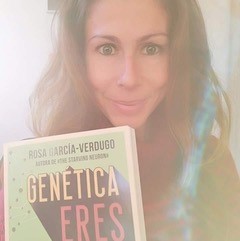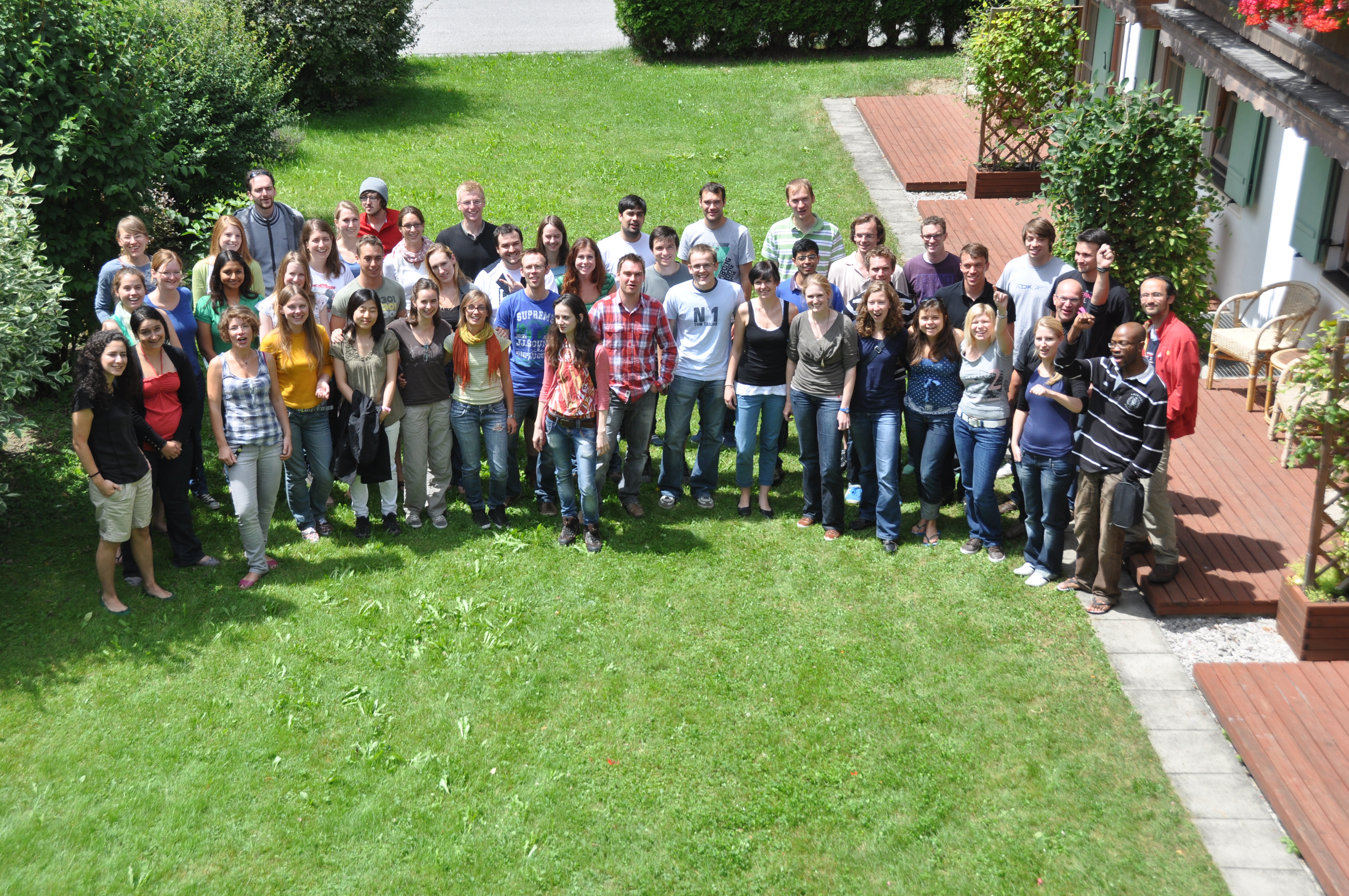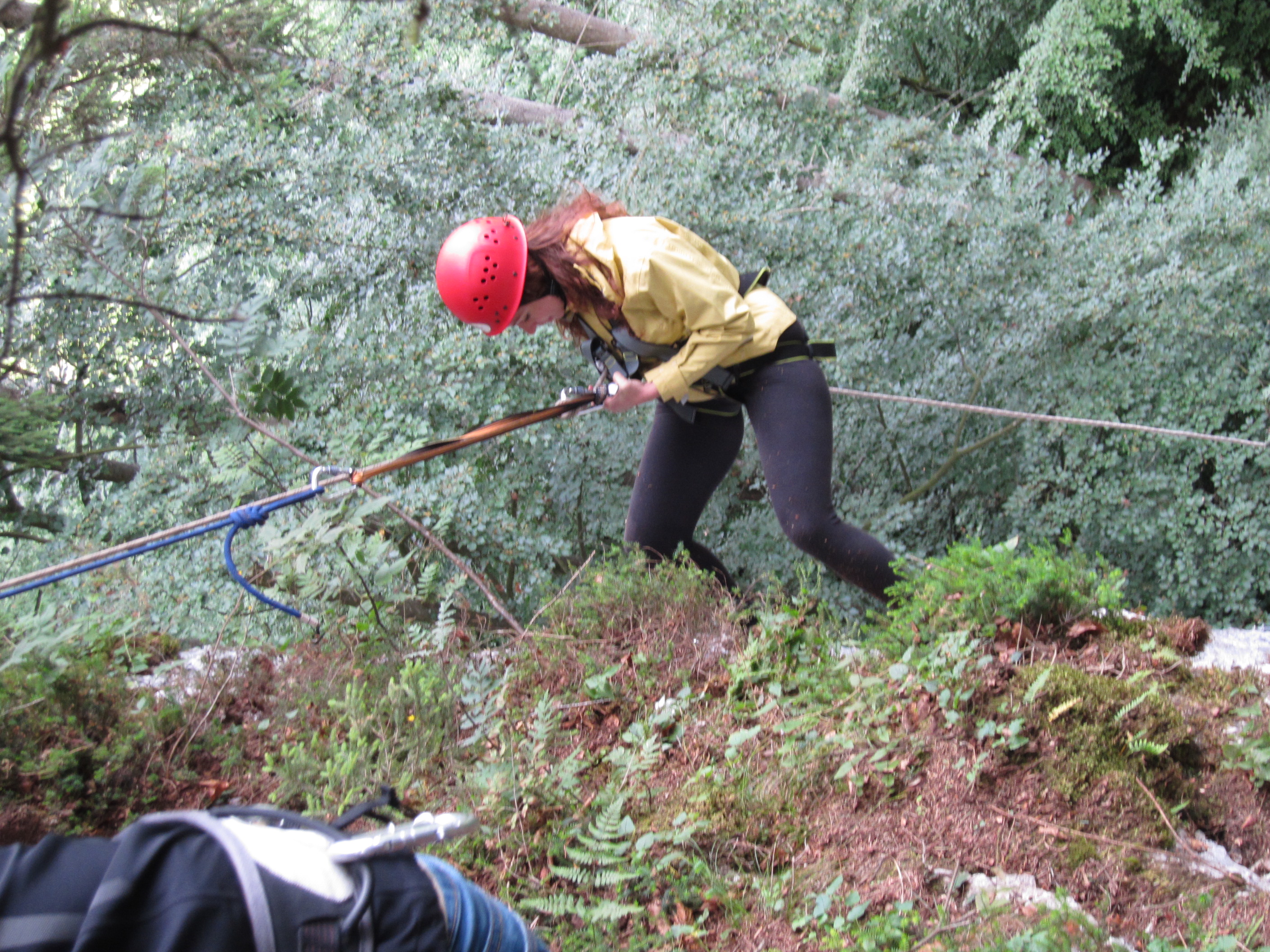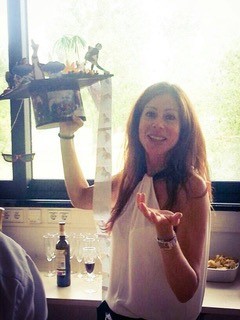
Rosa Garcia-Verdugo studied biochemistry and after some years at the bench, got a PhD in Neurobiology at the Max Planck Institute. She was an IMPRS-LS student from 2010 to 2015, working with Prof. Dr. Tobias Bonhoeffer. She is the founder of the website starvingneuron.com and collaborates with various science outreach networks in Spanish and English. Rosa currently works as a science journalist for the German Cancer Research Centre and as a freelance writer and communication consultant for biotech companies and European-funded research projects.
I would like to start with asking you about your memories of IMPRS, what was your project about and how do you remember your time as an IMPRS student?
My project dealt with neuronal plasticity in the mouse visual cortex and since it was an in vivo project, I worked with a mouse and a microscope. It was a very challenging, frustrating and lonely time but the IMPRS group we had, was really nice. I remember very fondly the IMPRS retreat, it was really fun and most of the workshops and talks were interesting. It was a good part of the PhD. Without it, it probably wouldn’t have been as good.
Was it already during your PhD time that you became interested in scientific communication?
Actually, it started before then. I was working in Barcelona in a research lab and, through a postdoc friend and some open science festivals that I was involved in, I started getting interested in the topic. Then, I started my own blog. It was a really small site, but it started growing. I started building a network, getting in touch with like-minded people who were doing it and were more experienced. While doing your PhD, the thought of an alternative career doesn’t usually cross your mind, but unless you really want to stay on a scientific career, you soon have to start working on a ‘side gig’, it is very important. It is awesome being a scientist but depending on where you want to move towards, it might not be enough.
 So were you learning by doing or did you take any additional classes, like in scientific writing?
So were you learning by doing or did you take any additional classes, like in scientific writing?
I did take a scientific writing workshop, but it was really more learning by doing. As a writer, you often have this feeling that you will never be good enough which I think is good because that means that you will always try to learn and develop further. But that is also true in science. You need to take an interest and care whether people on the other side understand your work, because otherwise what is the point? You are just presenting something but it would be just for you and the other person working on that project.
What drives you to do this job? Is it a passion for writing or do you actually really care about communicating science?
On the one hand, there is so much misinformation outside that it just pains me. On the other hand, it is really difficult to combat this. Adding more information doesn’t mean that you are going to convince people to change their minds. Right now, I am shifting towards thinking that you have to educate people to think for themselves. We have to start earlier and with the basics. And the basics are how to judge information: what I can believe and cannot believe, which sources are trustworthy and how to contrast information.
You mostly work as a freelancer. How do you search for your clients? Do you reach out to them or do they reach out to you?
After my PhD, I was working for a company but that didn’t work out because of motherhood. As a woman, it was hard to find a job that gave me the excitement that I wanted but also a certain flexibility; then, came Corona. I searched for a coach who recommended me to try freelancing and I was really scared because I thought: “where am I going to find clients?”. Funnily enough, it just happened. It was totally unexpected. I started looking for jobs, I got a couple of clients, not very high-paying jobs, but with a lot of available assignments. On the side, I started looking for more profitable [or interesting] clients. Now, I started a part-time position at the DKFZ (German Cancer Research Center) as a scientific journalist, which gives me a certain security but also allows me to maintain my freelance status and work on different topics, clients, and for various audiences. Some are aimed to the public, others to politicians, patients or doctors and I really like this. I don’t get bored and I learn a lot while being in charge of my time. Of course, the other side of the coin is certain instability.
What are the advantages and disadvantages of having a fixed position versus freelancing?
For me, one of the biggest disadvantages of working in a company is that you have much less freedom, not only in how you organize your time, but you cannot really get out of the set path and fixed hierarchy. Being a freelancer, you can choose your projects and your clients. You have direct contact with the client and you learn to know their needs. I find this good because you develop a relationship over time and you learn to know what they want. When you are in a company, usually there are three steps or more between the client and you and there is always so much miscommunication! Despite the uncertainty of what is going to happen at the end of the month, right now is a good time to be a freelancer in science communication or medical writing because there is high demand. Everyone has shifted to digital, which means most companies need to invest in their communication strategies and that means they need written content. I don’t really work much on videos, podcast, or social media but this is expanding and will become increasingly relevant.
 I wanted to ask you about your time management. You work in different roles: writing, editing, medical writing. Each job is a bit different, so how do you juggle in between them? What is your daily work routine?
I wanted to ask you about your time management. You work in different roles: writing, editing, medical writing. Each job is a bit different, so how do you juggle in between them? What is your daily work routine?
Usually, I don’t impose myself really tight deadlines. I have to work on something each day –unless I take a day off– and depending on the ongoing projects and the resources they require, I check how much work do I need to put in and decide whether to take more work on or when to deliver. Since my job does not put anyone in real danger, usually nothing is so important that needs to be done within the day. I usually work from 8-4 pm, when I have to pick-up my son. If I have a lot of work, sometimes I work after he is in bed. Now that the days are longer, I don’t mind working in the evening. On the weekends I might put an hour or two when my son is playing around. Most of my clients know about my schedule, and they are open to have a meeting while my kid is running around. I do not want to say that Corona was a positive thing, but I believe that for working mothers it opened the option of working from home, which gave us more flexibility and understanding from our colleagues. The good thing about being a freelancer, if you are paid by the piece, is that the time it took you to complete it doesn’t really matter. So, the more efficient you are, the more profitable your work can be. That being said, sometimes an assignment takes much longer than expected and agreeing on such a payment means you lose money.
Do you have any recommendation of jobs that students can look into?
Just out of the PhD, it may be worth looking into med com agencies. Remember, science communication is a very broad umbrella that covers a lot of things. There is marketing communication which can be directed to patients or doctors. There are companies developing health apps, where the communication can also have different targets. Then, there is the pure scientific communication for politicians or for schools, or what you might need for an EU-funded project, which now requires communication of the project’s goals and achievements to the public. There are a lot of opportunities and options and a background in science, pharmacy, or medicine is a plus. There are so many options you think you might like, but when you try them you don’t. And on contrary, there are things you would never consider but when you actually try them, they turn out to be fun. Besides, as a PhD student, sometimes you are not aware of the options available outside the lab. There is time to try things out and make the right decisions, so I recommend people to take it. It is also important to think that in 2022, we are not like our parents for whom staying in the same job might have been a sign of stability and success. Now, it is normal to change directions. As for deciding whether to work in a small or big company... there are pros and cons for both, but you can really start working in one, and if you like it, you stay; and if you don’t, you change. I really think that learning by doing is the way to go.
I would like to go back to your routines, but this time I would like to know how do you approach writing itself. When you have a topic, what is your strategy to deliver a piece?
The first step is always the research. You need to write based on something. You research the client, the topic, the audience, the objective. I have a form that my clients need to fill that specifies the audience, goal, main message... Some people ask me how to deal with the blank page. My answer is start writing. It doesn’t matter if it is the first sentence, the last sentence, or copy-pasting background information. You start writing and this fear is gone. BTW, this also works for writing a thesis!
Is there a piece that you have worked on that has stayed with you? Perhaps because it is your favorite or maybe because it was particularly difficult.
My baby is my book. I always wanted to write a book, even before it was a job. I wrote the book in 2018 and it was supposed to be published in 2019, but there was a delay. During which Corona happened and I was asked to write something about it. So I did, and over these two years that information became outdated. However, I have no regrets, I know and I was very open about how scientific facts can change and evolve. Even in the book itself, I wrote that it would probably be outdated in 5 or 10 years , as it is the nature of science. That over 700 people have bought – and hopefully read it– fills me with pride. It was my dream and I was so lucky that I get to see it everyday in my bookshelf.
Can people still buy it?
Yes. It is in Spanish, but still available. Sometimes I get feedback from people telling me they read the book and asking me for recommendations to continue reading. That really makes my day. I also get that feeling when clients say they are happy with the piece and they don’t need further changes. It is rewarding. For me, doing science at the bench was unrewarding most of the time, and the good thing for me in this job is that I do get good and fast rewards. The first is when I click the send button, and the second when someone reads my work and likes it.
What is your next career goal? Now that the book is out, what comes next for you?
I want to continue working on things that I like doing. I really like creative work and I would like to keep a broad portfolio. I do not intend to become a boss. I like teaching people, but I do not like to manage them. I also think I would like to write another book but not a scientific one. I like writing short fiction stories so at one point I would like to write a fiction book.
 How would you like to still develop yourself professionally? You mentioned that you are learning by doing, but do you still take courses or classes or are you a member of any groups or societies?
How would you like to still develop yourself professionally? You mentioned that you are learning by doing, but do you still take courses or classes or are you a member of any groups or societies?
In the last year of my PhD, I was developing a lot. I took German language courses and career development ones. And after having my child, it was the same. SEO, website design, GMP... I took a lot of courses. But there are different phases in life – sometimes you work more on developing your skill set and other times you build on that skill set. I will get back to doing some further training at one point, but right now I don’t feel the need to say: “let’s learn XYZ”. Recently I started a new job and one of the very interesting things about it is that it is in German. That’s the first time that I am really going to work in communication in German. Until now, 99% of my communication work was in English. It will never sound as natural as my mother tongue, but although challenging, I am excited about taking up this job. The good thing about this job is that you are basically learning all the time, about different topics, platforms, technology and/or methods.
Are there any people in the world of scientific communication that you follow and you are inspired by?
I used to read a lot of blogs. In that time, blogs were ‘the thing’ and that was also something I could do when I was at the microscope. Among podcasts, I always really liked ‘The Infinite Monkey Cage’ in BBC Four. It is humour and science. But what I listen to when I am cooking is ‘Inquiring Minds’. This woman is a neuroscientist who interviews people on various research topics. Usually those who have written a book or who are into neuroscience. And ‘Babbage from The Economist’. They talk about the latest trends in science and technology, e.g. not long ago, they had one on aging. In the early 2000’s there was one American blogging network including two female neuroscientists. One of them was the boss of the lab and the other one was a postdoc. What I really liked about them was that they did not talk only about science, but also about their struggles as bosses or as females in science. This feeling of community, which sometimes is missing, especially among female scientists, you can also get from science communicators.
How do you think the development of new technologies influences the science communication? Are you worried that AI may replace you in your job, since it is already being used for creating content online?
I don’t think that AI is going to get that creative. It is good for detecting patterns, following them and building something based on them, but creativity is precisely the opposite. However, I don’t expect that social media is going to become less influential. We just need to learn how to handle it better. Actually, I was talking to someone at WHO about misinformation and they told me that they are building up a program focusing on what it is, how to deal with it, and how to counteract it. I don’t want to get into things like TikTok, but it is certainly becoming a very important medium to communicate with younger audiences. E.g. if you want to approach teenagers about HPV vaccine and tell boys this is also important to them not just to girls, you have to think about TikTok as a medium. I wouldn’t have thought that a pharmaceutical company targeting doctors would use TikTok, but maybe in 5 years it will be the case.
Do you have any advice for current IMPRS students?
Be open minded. Have a pet project! Whatever it is. Something where you can use your creativity and interest. And network! These two things. The sooner you start the better. One of my current clients I got thanks to one of my IMPRS contacts, because she remembered that I was working in science communication. We were in IMPRS together, we met once in the U-Bahn. We wrote on LinkedIn and she said “Are you still doing this? My marketing department needs some help”. Then, I got the client. I didn’t do anything particular, aside from having fun during my PhD with some nice people. Don’t restrict yourself to talking to people from your lab about your topic. Go for beers and mingle!
Authors: Alexandra Eklund, Marta Cipińska, Claudia Gonzalez Leal
